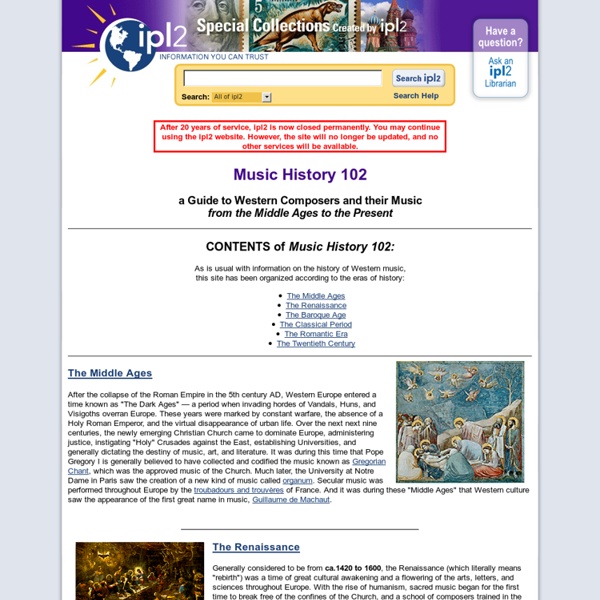The Canadian Encyclopedia
Since colonization began in the 17th century, the mainstream of musical development has been little affected by native music. The original settlers transplanted their songs, dances and religious chants, and successive waves of immigrants reinforced old-world traditions. Forrester, Maureen (Video) Maureen Forrester sings Urlicht from the fourth movement of Gustav Mahler's second symphony, accompanied by an orchestra under the baton of Glenn Gould, in the CBC-TV series Chrysler Festival, broadcast on 20 February 1957 (courtesy CBC-TV). Marshall, Lois, Video Soprano Lois Marshall sings Beim Schlafengehen, one of Richard Strauss's Four Last Songs, in an episode of the CBC-TV arts series Graphic hosted by Glenn Gould, broadcast on 15 October 1962 (courtesy CBC). Gould, Glenn (Video) In "The Anatomy of a Fugue" by Bach in the CBC-TV series, "Festival", broadcast on 4 March 1963 (courtesy CBC-TV and Glenn Gould Estate). John Weinzweig, composer, teacher, administrator Mills, Alan Adaskin, Murray
Music Files - free downloads: Sheet Music, MIDI, MP3, Classical, Traditional, Film
The Method Behind the Music
15 Free Music Activities and Lesson Plans for the Classroom | Resources for Music Education
The web is a great place to find free music activities and lesson plans that can be used in the classroom. Here are 15 sites that provide helpful materials for teachers. Music Quizzes – The Music Tech Teacher provides more than 130 music quizzes and games that can be used in the classroom. Quizzes cover everything from music notes and terms to famous musicians and composers. Sound Piper – Sound Piper offers a unique page with a wide range of music classroom activities to teach basic elements of music. The Music Rack – The Music Rack provides free sheet music downloads, staff paper, and other music teacher resources. Levy Sheet Music Collection – The Lester S. Musicards – Musicards are online music theory flashcards. eMusicTheory.com – This site hosts a number of different materials that can only be accessed by members. Flash Music Games – This no-frills site offers a wide range of online flash music games for teachers and students.
Classical Period
Music Practice Tips, Guidelines, Strategies, Overcome Stage Fright, Build a Career - The Musician's Way Blog by Gerald Klickstein
Gerald KlicksteinSeptember 21, 2014creative process, creativity, music practice Tags: creative process, creativity, deep practice, deliberate practice, divergent thinking, how to practice music, motivation, music practice, practicing music, problem-solving, The Musician's Way “Making the simple complicated is commonplace; making the complicated simple, awesomely simple, that’s creativity.” -Charles Mingus, bassist (The Musician’s Way, p. 55) Musical problem-solving requires creative thinking, yet the style of thinking that’s commonly taught in schools may not serve our needs in the practice room. That is, a subject such as basic math nurtures convergent thinking that zeroes in on single solutions.
Classical Period Music (2/2)
9 Black composers who changed the course of classical music history
From Scott Joplin to Florence Price, the music of these brilliant composers has too long been neglected in Western classical music tradition. Following countless others, the shocking and tragic death of African American man George Floyd at the hands of police has sparked a worldwide uprising against racial inequality, and protests calling for the unfailing protection of Black lives from police and system brutality. The music industry and wider communities took a stand on Tuesday 2 June 2020 with Blackout Tuesday – a vow to silence an industry propped up by Black history and culture on social media and across airwaves for a day, with time to pause and reflect, and take a moment to plan effective, lasting and truly uniting change in the fight to end discrimination on grounds of race.
Baroque music Facts for Kids
Frontispiece of Monteverdi's opera L'Orfeo, Venice edition, 1609. Composed at the beginning of the Baroque period, this was also one of the first operas to be written. Baroque music is a set of styles of European classical music which were in use between about 1600 and 1750. The word "Baroque" is used in other art forms besides music: we talk about Baroque architecture, painting, sculpture, dance and literature. The Baroque period comes between the Renaissance and the period of Classicism. History Musicians think of the Baroque period as starting around 1600. The change from writing music in the Baroque style to the Classical style was much more gradual. 1750 is the year that Bach died, so it is an easy date to choose for the end of the Baroque period. The Baroque was a time when people liked large spaces and a lot of ornamentation. Styles and instruments The idea of two contrasting groups was used a lot in Baroque music. Baroque music was often a melody with a bass line at the bottom. Suite
Anti-Asian Hate: It’s Time To Stop Playing “Chinatown, My Chinatown” – Musicology Now
Three days after the July 4th mass shooting in Chicago I woke up to a piece of news on the homepage of the World Journal, the largest Chinese-language newspaper in the United States. An elderly Korean American man in Flushing, Queens, was approached and shoved at a gas station by a man he did not know, who shouted, “I hate Chinese!” When the attending police officer learned the man was not physically injured, he advised him to let it go. “You just had a bad day.” The old man replied, “Isn’t there a nationwide problem with hate against Asians? I don’t want this person to take to the streets and continue to hurt others.” Anti-Asian hate violence has been regular news in the World Journal over the past two years. The invisibility of anti-Asian racism is a reflection of the historical invisibility of Asians themselves in the U.S. cultural imagination. Actress Cheet Sing Mui as a woman warrior, by May’s Photo Studio in San Francisco. Chinese musicians.



